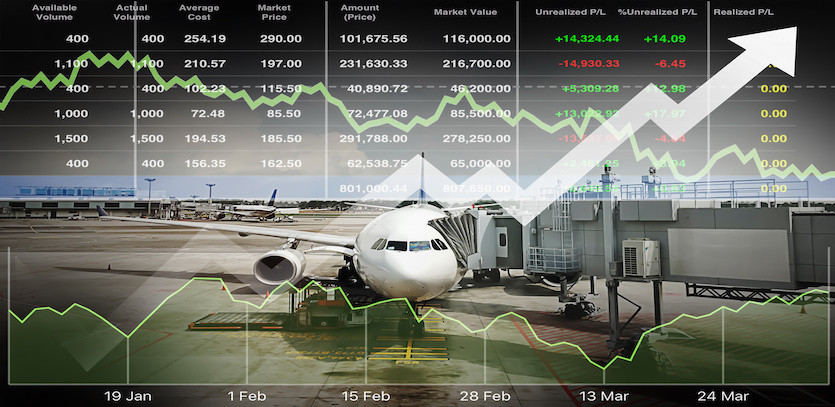Revival of the Airline Industry in 2023
As 2023 progresses, the airline industry demonstrates signs of a robust recovery from the Covid-19 crisis. Based on the earnings released, airlines appear to be resuming their pre-pandemic vigor, backed by a potent demand surge for air travel.
According to the Transportation Security Administration (TSA), the volume of air passengers in 2023 mirrors that of pre-pandemic times. Consequently, this increase in air travel has fueled a corresponding upswing in airline stocks.
A 'Risk-On' Investment Environment
In the first half of 2023, the US stock market displayed notable growth. Amid this "risk on" environment, where Wall Street continues to reach new heights, investors are increasingly finding appeal in more dynamic stocks like those in the airline sector.
Being a cyclical industry, the airline business mirrors broader economic movements. As consumer and corporate confidence rise, ticket sales escalate, suffering only when economic conditions worsen and people refrain from spending.
The Current Airline Stocks Landscape
The airline sector is currently buzzing in the market, thanks to the US economy's gradual recovery from the Covid-19 induced disruptions. TSA data from June 2023 reports the highest air travel levels since 2019, indicating a return to pre-pandemic health for the airline industry.
However, it's essential to remember that not all airline stocks are identical. Nine specific airline stocks demonstrate promising momentum, fair valuation, and manageable debt, offering attractive potential investment options.
Pros and Cons of Investing in Airline Stocks
Investors looking to venture into airline stocks should consider the following potential benefits and risks:
Benefits of Airline Stocks
- Growth Potential: During periods of global economic expansion, airlines often witness substantial growth due to increased passenger demand and revenue. As the economy recovers and travel demand increases, airline stocks can leverage this growth opportunity.
- Dividend Income: Some well-established airlines provide dividends to their shareholders, offering an extra income source, particularly appealing during periods of economic stability.
- Contrarian Opportunities: The airline industry's sensitivity to external factors can result in significant stock price fluctuations, presenting opportunities for contrarian investors to purchase undervalued stocks and potentially sell at a higher price when market sentiment improves.
- Portfolio Diversification: Incorporating airline stocks into a diverse investment portfolio can expose investors to the transportation sector. Diversification across various industries can mitigate the effect of poor performance in a specific sector on the overall portfolio.
Top Airline Stocks of July 2023
- Alaska Air Group (ALK) - 22.00%
- Allegiant Travel (ALGT) - 78.70%
- American Airlines Group (AAL) - 39.40%
- Copa Holdings (CPA) - 34.50%
- Delta Air Lines (DAL) - 44.80%
- JetBlue Airways (JBLU) - 34.30%
- Ryanair Holdings (RYAAY) - 42.00%
- Southwest Airlines (LUV) - 10.60%
- United Airlines Holdings (UAL) - 44.10%
In 2023, the 19 stocks within the IBD's Transportion-Airline industry group have gained approximately 50%. That's the fifth-best year-to-date increase among the 197 industries tracked by IBD. United Airlines (UAL), Delta Air Lines (DAL), and American Airlines (AAL) stock have all gained between 44-48% since the end of 2022. Copa (CPA), the leading Latin American air carrier, has also seen an increase of 32% so far in 2023.
However, not all airlines have fared so well. Southwest Airlines (LUV) has experienced a modest increase of 7%, while Spirit Airlines (SAVE) shares have declined by 3%.
The Risks With Airline Stocks
Unforeseen circumstances, such as the Covid-19 pandemic, can halt global air travel. For instance, the end of 2022 saw the airline industry grappling with extreme weather conditions, forcing most U.S airlines to suspend operations temporarily.
However, the impacts of such setbacks have proven to be temporary, with most airlines resuming normal operations within days. The aftermath of these disruptions showcases the resilience of airline stocks, reinforcing their appeal to investors who can navigate the industry's inherent volatility.
Are Airline Stocks a Good Buy?
With the market in a confirmed uptrend and IBD ratings for airline stocks showing strength, now could be the time for investors to step up and add to their exposure. However, it's crucial for investors to be selective and ensure they're not overextending their portfolio.
Airline stocks are intrinsically linked to economic cycles as business and consumer travel trends ebb and flow with broader spending trends. All investments carry risk, and cyclical investments like airlines can be more volatile, fluctuating more quickly based on economic news.
Given these factors, here are a few leaders in the airline industry that meet the following criteria:
- Minimum market capitalization of $2 billion
- Greater than 10% year-to-date return
- Forward price-to-earnings ratio of less than 10
- Debt-to-assets ratio of less than 0.7
Risks of Airline Stocks
While investing in airline stocks can be appealing, investors must be aware of certain risks:
- Cyclical Nature: The airline industry is vulnerable to economic downturns and geopolitical events, which can decrease travel demand and affect revenues and profitability.
- Fuel Price Volatility: Fuel costs significantly impact airline operations. Changes in oil prices can affect operating expenses and profit margins, and high fuel prices can stress airline stocks, influencing their financial performance.
- Regulatory Concerns: The airline industry must adhere to strict regulations and safety standards. Compliance can be expensive, and any safety-related issues can tarnish an airline’s reputation and stock performance.
- Competition: The airline industry is fiercely competitive, and airlines may engage in price wars to attract customers. Industry mergers and acquisitions can alter the competitive landscape and create volatility in stock prices.
In conclusion, airline stocks are once again capturing the attention of savvy investors as the industry bounces back from the Covid-19 pandemic. Although they are tied to the health of the broader economy and can be influenced by a variety of external factors, airline stocks present promising growth potential and rewarding opportunities for strategic investors. Even so, it's imperative to exercise diligence and consider the inherent risks, such as fuel price volatility, regulatory constraints, and competitive pressures, before making any investment decisions. The past performance of these stocks, while indicative of current market sentiment, does not guarantee future returns, making careful assessment crucial for a rewarding investment experience.





